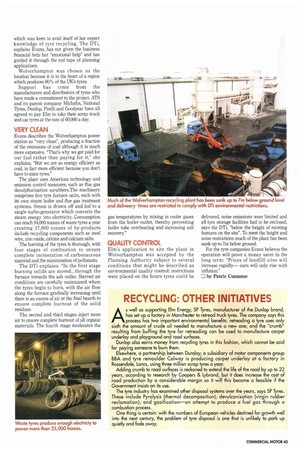RECYCLING: OTHER INITIATIVES
Page 49

If you've noticed an error in this article please click here to report it so we can fix it.
As well as supporting Elm Energy, SP Tyres, manufacturer of the Dunlop brand, has set up a factory in Manchester to retread truck tyres. The company says this process has two important environmental benefits: retreading a tyre uses only sixth the amount of crude oil needed to manufacture a new one; and the "crumb" resulting from buffing the tyre for retreading can be used to manufacture carpet underlay and playground and road surfaces.
Dunlop also earns money from recycling tyres in this fashion, which cannot be said far paying someone to burn them.
Elsewhere, a partnership between Duralay, a subsidiary of motor components group BBA and tyre remoulder Colway is producing carpet underlay at a factory in Rossendale, Lancs, using three million scrap tyres a year.
Adding crumb to road surfaces is reckoned to extend the life of the road by up to 22 years, according to research by Coopers & Lybrand, but it does increase the cost of road production by a considerable margin so it will this become a feasible if the Government insists on its use.
The tyre industry has examined other disposal systems over the years, says SP Tyres. These include Pyrolysis (thermal decomposition); devulcanisation (virgin rubber reclamation); and gasification—an attempt to produce a fuel gas through a combustion process.
One thing is certain: with the numbers of European vehicles destined for growth well into the next century, the problem of tyre disposal is one that is unlikely to park up quietly and fade away.
































































































